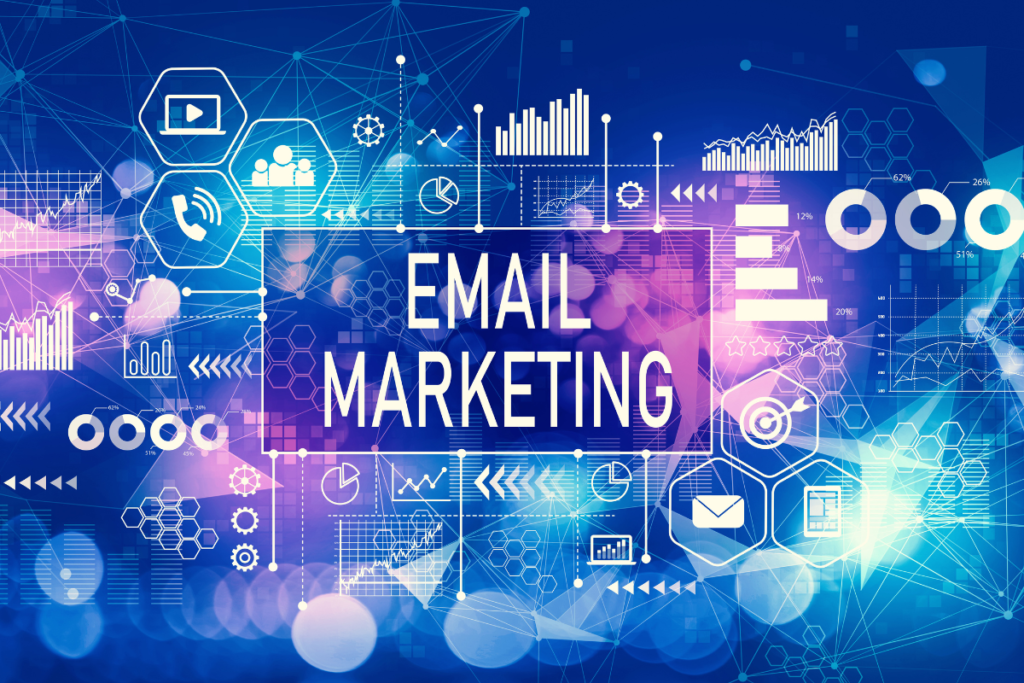
Introduction
Email marketing is a great way for businesses to talk to their audience and get them interested because when businesses know how to use different types of marketing and the good things it can do, they can make their marketing even better.
Email can be defined as the practice of sending commercial messages to a group of people via email because It allows businesses to build relationships with their customers, promote products or services and ultimately drive sales.
Different kinds of email marketing serve various purposes these include:
- Newsletter Emails: These are regular communications that provide valuable content, updates and information to subscribers.
- Promotional Emails: Designed to promote specific products, services, or offers to encourage recipients to make a purchase.
- Transactional Emails: These emails are triggered by a specific action or transaction, such as a purchase confirmation or order status update.
- Welcome Emails: Sent to new subscribers or customers to introduce them to the brand, set expectations, and provide relevant information.
- Abandoned Cart Emails: Aimed at recovering lost sales by reminding customers of items they left in their shopping cart and encouraging them to complete the purchase.
Businesses gain various advantages from email marketing
- Cost-Effectiveness: When you compare it to old-fashioned marketing methods, email marketing is a budget-friendly way to connect with lots of people without spending much.
- Reach a Wide Audience: With email marketing, businesses can reach a global audience instantly, regardless of their physical location. Example. upskillrocket.in
- Targeted Marketing: Email marketing allows businesses to segment their audience and send tailored messages to specific groups, increasing relevance and engagement.
- Easy to Track and Measure: Email marketing platforms provide analytics and insights, allowing businesses to track open rates, click-through rates, conversions, and other metrics to measure the success of their campaigns.
- Increased Conversion Rates: Through personalized and targeted messaging, email marketing has the potential to significantly increase conversion rates and drive revenue.
What is Email Marketing?
Definition of Email Marketing
Email marketing means sending business-related messages to a group of people using email. It’s a strong method for businesses to show off their stuff, make friends with customers and get more sales because Email marketing is all about using emails to talk to the right people and help your business grow.
Types of Email Marketing
Discover the diverse world of marketing with a deep dive into its various types. From informative newsletter emails to enticing promotional emails, and even transactional emails that enhance customer experiences. Explore the power of welcome emails, abandoned cart emails and re-engagement/win-back emails, all strategically designed to increase engagement and conversion rates. Unleash the potential of each email type and maximize your marketing efforts.
Newsletter Emails
Newsletter emails are a crucial aspect of marketing. They enable businesses to connect with their audience, establish relationships, and share valuable content. Below are some important considerations for creating effective newsletter emails:
- Create an enticing subject line to encourage recipients to open the email.
- Create a visually attractive format that is simple to read and navigate.
- Include valuable and relevant content, such as industry news, tips, and updates.
- Incorporate engaging visuals like images or videos to capture readers’ attention.
- Personalise the email by addressing recipients by their names and segmenting your audience for targeted content.
- Include a clear call-to-action that motivates readers to take the desired action, such as visiting your website or making a purchase.
- Regularly assess and analyse email metrics to gain insights into which content resonates most with your audience and make improvements accordingly.
Remember, a well-crafted newsletter email can be a powerful tool for fostering customer loyalty and driving engagement. Therefore, it is important to invest thought into your content and design in order to maximise the impact of your newsletters.
Promotional Emails
Promotional emails are a powerful tool for businesses to advertise products, services or special deals to customers. They are designed to grab attention, spark interest and drive conversions. By personalising content and using compelling visuals, promotional emails can effectively engage recipients and encourage them to take action.
Transactional Emails
Transactional Emails are an essential component of marketing, offering vital information to customers following a specific action. They are highly personalised and serve as confirmations for transactions, receipts for orders, or emails for resetting passwords. These emails have higher rates of being opened and clicked, making them effective for fostering customer loyalty and encouraging engagement.
Benefits of Email Marketing
Discover the amazing benefits of email marketing that can transform your business! Email offers numerous advantages, from being cost-effective to reaching a large audience and improving customer relationships. It is a powerful tool for engaging with your target market, easily tracking and measuring results, and achieving higher conversion rates. Let’s delve into the world of marketing and discover the limitless possibilities it brings to business growth.
Cost-Effective
Email marketing is an affordable way to promote your business and reach a wide audience.
Here are some reasons why:
- Low Cost: Compared to traditional marketing methods, email marketing is much cheaper, saving you money on printing, postage, and advertising fees.
- High ROI: With a relatively low investment, email marketing can generate a high return on investment, especially when targeting the right audience.
- Personalisation: You can segment your email list and send tailored messages to specific groups, increasing the likelihood of higher engagement and conversions.
- Automation: Marketing tools allow you to automate your campaigns, saving time and effort in managing and sending emails.
- Tracking and Analytics: With marketing platforms, you can easily track and measure the success of your campaigns, including open rates, click-through rates and conversion rates.
Reach a Wide Audience
- Email enables businesses to reach a wide audience by delivering messages directly to their inbox, resulting in increased exposure.
- By segmenting your email list based on demographics, interests, or purchase history, you can target different groups within your audience and tailor messages specifically for them.
- Marketing allows for personalised communication, making each recipient feel valued and more likely to engage with your content.
- With email marketing software, you can automate your campaigns, sending messages to your audience at predetermined times or based on specific triggers.
- Emails can be easily forwarded or shared, extending the reach of your message beyond your initial subscriber list.
Targeted Marketing
Targeted marketing is an essential aspect of email marketing, enabling businesses to customise their messages for specific groups of individuals. By dividing their email lists based on demographics, interests, or previous interactions, companies can deliver highly relevant content, leading to increased engagement and conversion rates.
- Segmentation: Divide your email list into smaller groups based on demographics, interests, or behaviour.
- Personalisation: Customise your emails to address the unique needs and preferences of each segment.
- Increased Relevance: By sending targeted emails, you can provide content that is more likely to resonate with your audience, resulting in higher open and click-through rates.
- Improved Conversion: Since targeted emails are more relevant, they have a higher chance of converting recipients into customers.
- Better ROI: By focusing your efforts on individuals who are more likely to be interested in your products or services, you can optimise your marketing budget and achieve a higher return on investment.
A clothing retailer used targeted marketing to reach customers who had previously made purchases in specific categories. They sent personalised emails featuring new arrivals and exclusive discounts for those particular categories, resulting in a significant increase in repeat purchases and customer loyalty.
Frequently Asked Questions
Email marketing campaigns can take various forms, including promotional emails, informational emails, weekly newsletters, recurring campaigns, one-off campaigns and personalized content.
By reaching a large audience with one email, businesses can save on printing and postage costs associated with traditional marketing methods.
Email marketing campaigns can generate traffic to a business's website by including links to blog posts, special offers or other relevant content.
By sending regular updates, valuable information and personalized offers, businesses can nurture customer relationships and keep them engaged.
One of the major perks of email marketing is the ability to make content personal. When businesses tailor their campaigns and create content that speaks directly to the recipient, it boosts engagement and forges a more personal connection.
